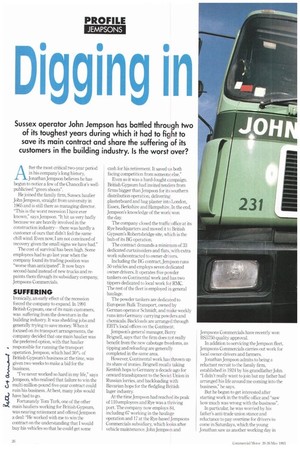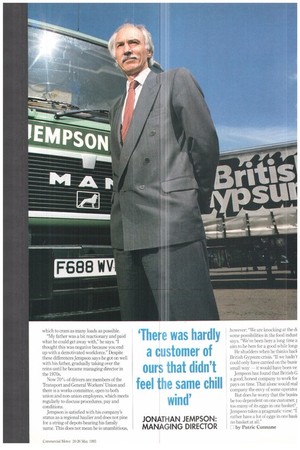Digging in
Page 28

Page 29

If you've noticed an error in this article please click here to report it so we can fix it.
Sussex operator John Jempson has battled through two of its toughest years during which it had to fight to save its main contract and share the suffering of its customers in the building industry. Is the worst over?
After the most critical two-year period in his company's long history, Jonathan Jempson believes he has begun to notice a few of the Chancellor's wellpublicised "green shoots".
He joined the family firm. Sussex haulier John Jempson, straight from university in 1965 and is still there as managing director. "This is the worst recession I have ever known," says Jempson. "It hit us very badly because we are heavily involved in the construction industry— there was hardly a customer of ours that didn't feel the same chill wind. Even now, I am not convinced of recovery given the small signs we have had."
The cost of survival has been high. Some employees had to go last year when the company found its trading position was "worse than anticipated". It now buys second-hand instead of new trucks and repaints them through its subsidiary company, Jempsons Commercials.
SUFFERING
Ironically, an early effect of the recession forced the company to expand. In 1991 British Gypsum, one of its main customers, was suffering from the downturn in the building industry. It was shedding jobs and generally trying to save money When it focused on its transport arrangements, the company decided that one main haulier was the preferred option, with that haulier responsible for running the transport operation. Jempson, which had 30% of British Gypsum's business at the time, was given two weeks to make a bid for the business.
"I've never worked so hard in my life," says Jempson, who realised that failure to win the multi-million-pound five-year contract could ruin his business. At best, many jobs would have had to go.
Fortunately Tom Turk, one of the other main hauliers working for British Gypsum, was nearing retirement and offered Jempson a deal: "He worked with me to win the contract on the understanding that I would buy his vehicles so that he could get some cash for his retirement. It saved us both facing competition from someone else."
Even so it was a hard-fought campaign. British Gypsum had invited tenders from firms bigger than Jempson for its southern distribution operation, delivering plasterboard and bag plaster into London, Essex, Berkshire and Hampshire. In the end, Jempson's knowledge of the work won the day.
The company closed the traffic office at its Rye headquarters and moved it to British Gypsum's Robertsbridge site, which is the hub of its FIG operation.
The contract demands a minimum of 33 dedicated curtainsiders and flats, with extra work subcontracted to owner-drivers.
Including the BG contract, Jempson runs 50 vehicles and employs seven dedicated owner-drivers. It operates five powder tankers on Continental work and has two tippers dedicated to local work for RINIC. The rest of the fleet is employed in general haulage.
The powder tankers are dedicated to European Bulk Transport, owned by German operator Schmidt, and make weekly runs into Germany carrying powders and chemicals. Backloads are arranged through EBT's local offices on the Continent.
Jempson's general manager, Barry Brigmell, says that the firm does not really benefit from the new cabotage freedoms, as tipping and reloading are generally completed in the same area.
However, Continental work has thrown up its share of ironies. Brignell recalls taking Kentish hops to Germany a decade ago for onward transhipment to the Soviet Union in Russian lorries, and backloading with Bavarian hops for the fledgling British lager industry At the time Jempson had reached its peak of 110 employees and Rye was a thriving port. The company now employs 84, including 67 working in the haulage operation and 17 at the Rye-based Jempsons Commercials subsidiary, which looks after vehicle maintenance. John Jempson and Jempsons Commercials have recently won BS5750 quality approval.
In addition to servicing the Jempson fleet, Jempsons Commercials carries out work for local owner-drivers and farmers.
Jonathan Jempson admits to being a reluctant recruit to the family firm, established in 1924 by his grandfather John. "I didn't really want to join but my father had arranged his life around me coming into the business," he says.
But he began to get interested after starting work in the traffic office and "saw how much was wrong with the business".
In particular, he was worried by his father's anti-trade union stance and reluctance to pay overtime for drivers to come in Saturdays, which the young Jonathan saw as another working day in which to cram as many loads as possible.
My father was a bit reactionary and paid what he could get away with," he says. "I thought this was negative because you end up with a demotivated workforce." Despite these differencesJempson says he got on well with his father, gradually taking over the reins until he became managing director in the 1970s.
Now 70% of drivers are members of the Transport and General Workers Union and there is a works committee, open to both union and non-union employees, which meets regularly to discuss procedures, pay and conditions.
Jempson is satisfied with his company's status as a regional haulier and does not pine for a string of depots bearing his family name. This does not mean he is unambitious, however: "We are knocking at the dc some possibilities in the food indust says. "We've been here a long time a aim to be here for a good while long He shudders when he thinks back British Gypsum crisis. "If we hadn't could only have carried on the busir small way — it would have been ve.
Jempson has found that British G a good, honest company to work for pays on time. That alone would mal company the envy of some operator
But does he worry that the busini be too dependent on one customer. I too many of its eggs in one basket?: Jempson takes a pragmatic view: "I rather have a lot of eggs in one bask no basket at all."
1 by Patric Cunnane
















































































